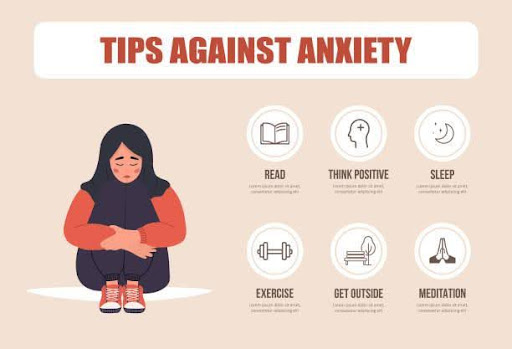Anxiety is a natural stress response, but when it becomes overwhelming, it can interfere with daily life and leave you feeling stuck. If you’ve been struggling with anxiety, you’re not alone, and the good news is that there are steps you can take to manage and even overcome it. Starting your journey to overcome anxiety may feel daunting at first, but with the right anxiety recovery steps, you can regain control and find peace of mind again.
We’ll walk you through practical and effective steps to help you start your journey. We’ll also explore the importance of patience and self-compassion along the way. So, if you’re ready to begin taking control of your mental health, read on and discover how anxiety recovery is within your reach.
Understanding Anxiety and Why It Happens
Before diving into the anxiety recovery steps, it’s important to understand what anxiety is and why it occurs. Anxiety is a feeling of worry, fear, or unease, often about something with an uncertain outcome. It’s the body’s natural response to stress, meant to alert us to danger. But for some, anxiety becomes more than just a momentary response to a stressful event; it can become chronic, leading to feelings of constant nervousness, fear, or dread.
The causes of anxiety can vary, but common triggers include stressful life events, ongoing worry, trauma, and even biological factors like genetics or chemical imbalances in the brain. It’s important to recognize that anxiety is not something you “make up” or should be ashamed of—it’s a real experience that many people face, and it’s entirely treatable.
Step 1: Acknowledge and Accept Your Anxiety
The first step in overcoming anxiety is to acknowledge it. Denying or ignoring anxiety will only give it more power over you. It’s essential to recognize that you’re struggling with anxiety so that you can take action toward healing. This doesn’t mean accepting it as permanent, but rather acknowledging it as something that can be managed and overcome with time.
Acceptance also involves being kind to yourself. Anxiety can be overwhelming, but instead of beating yourself up for feeling anxious, treat yourself with compassion. Remind yourself that it’s okay to feel this way and that you’re taking positive steps to improve your mental health. This mindset shift can already begin to reduce some of the power anxiety has over you.
Step 2: Learn About Anxiety Recovery Steps
Now that you’ve acknowledged your anxiety, it’s time to start taking action. There are several anxiety recovery steps you can take, but they all begin with learning more about anxiety and how it affects you personally. By gaining a deeper understanding of your anxiety, you’ll be better equipped to manage and reduce it.
Some helpful resources include books, articles, and online courses that focus on managing anxiety. You might also want to seek professional help, such as seeing a therapist who specializes in cognitive behavioral therapy (CBT) or other treatment methods for anxiety. Knowledge is power, and the more you learn about your anxiety, the more control you can take back.
Step 3: Practice Mindfulness and Meditation
Mindfulness and meditation are powerful tools in anxiety recovery. Both practices help you stay present and focused on the here and now, which can be incredibly helpful when your mind is racing with anxious thoughts. By regularly practicing mindfulness, you can learn to observe your thoughts without getting caught up in them.
Meditation, even if done for just a few minutes each day, can help quiet the mind and reduce anxiety. Many people find that focusing on their breath, doing a body scan, or listening to guided meditation can significantly lower anxiety levels.
Step 4: Establish a Routine and Healthy Habits
One of the most effective ways to manage anxiety is by establishing a routine. Anxiety can often stem from feeling out of control, and having a daily routine can bring a sense of structure and predictability to your life. Start by setting aside time for work, relaxation, meals, and sleep, ensuring that you’re taking care of your basic needs.
In addition to a routine, healthy habits like regular exercise, balanced nutrition, and proper sleep are essential for anxiety recovery. Exercise, in particular, is a natural stress reliever, releasing endorphins that help improve your mood and reduce feelings of anxiety. Eating a healthy, well-balanced diet with plenty of whole foods can also support mental clarity and overall well-being. Lastly, prioritizing good sleep hygiene and ensuring you get enough rest each night will keep your body and mind functioning at their best.
Step 5: Challenge Negative Thought Patterns
One of the core principles of cognitive behavioral therapy (CBT) is learning to challenge and reframe negative thought patterns. Often, anxiety arises from distorted thinking—such as overestimating the likelihood of something bad happening or assuming the worst-case scenario. By learning to recognize these negative thoughts and replace them with more balanced, realistic ones, you can reduce anxiety.
For example, if you’re anxious about an upcoming presentation, instead of thinking, “I’m going to mess this up,” try reframing the thought to, “I’m prepared, and I can handle this.” This simple shift can have a profound impact on how you feel and how you respond to anxious situations.
Step 6: Seek Support From Others
You don’t have to go through your anxiety recovery journey alone. Seeking support from others, whether it’s friends, family, or a support group, can provide you with comfort and understanding. Talking about your experiences can be a great way to process your emotions and receive reassurance.
If you find that your anxiety is severely affecting your life, consider reaching out to a mental health professional who can guide you through therapy or treatment options. Therapy can be especially helpful in uncovering the root causes of your anxiety and developing effective coping strategies.
Step 7: Be Patient and Consistent
Finally, one of the most important anxiety recovery steps is being patient with yourself. Overcoming anxiety is not an overnight process, and there may be setbacks along the way. It’s essential to remain consistent with your efforts, even if progress feels slow at times. Celebrate the small victories, and remember that each step you take is moving you closer to a place of peace and stability.
The journey to overcoming anxiety is personal, and it’s different for everyone. However, by consistently implementing these anxiety recovery steps, you can make meaningful progress toward feeling better and living a more fulfilling life.
FAQs About Overcoming Anxiety
1. How long does it take to recover from anxiety?
The time it takes to recover from anxiety can vary from person to person. Some people may start feeling better after a few weeks of implementing anxiety recovery steps, while others may take longer. Patience is key, and it’s important to stay committed to your healing process.
2. Can therapy really help with anxiety?
Yes, therapy, particularly cognitive behavioral therapy (CBT), has been shown to be highly effective in treating anxiety. A therapist can help you identify and challenge negative thought patterns, develop coping strategies, and work through any underlying issues contributing to your anxiety.
3. Do I need medication to overcome anxiety?
Medication can be helpful for some people, especially in more severe cases of anxiety. However, many individuals find success in managing their anxiety through therapy, lifestyle changes, and self-care practices. It’s best to consult with a healthcare professional to determine the right approach for you.
4. Can lifestyle changes really make a difference in anxiety recovery?
Absolutely! Healthy habits such as regular exercise, a balanced diet, and good sleep hygiene play a significant role in managing anxiety. These lifestyle changes support your overall well-being and help reduce stress, which can help alleviate anxiety symptoms.
5. How can I prevent anxiety from returning?
While it’s impossible to completely eliminate anxiety, you can reduce the likelihood of it returning by continuing to practice the anxiety recovery steps that have worked for you. This includes maintaining a healthy lifestyle, managing stress, and continuing therapy or support if needed.
Conclusion
Starting your journey to overcome anxiety is a brave and empowering decision. By taking the time to understand your anxiety, practicing mindfulness, building healthy habits, and seeking support, you can begin to regain control of your life and experience peace of mind once again. Remember, anxiety recovery is a process, and each step you take is a step toward a healthier and happier future. So, don’t be afraid to start today—take one small step at a time, and trust that you’re moving in the right direction.



